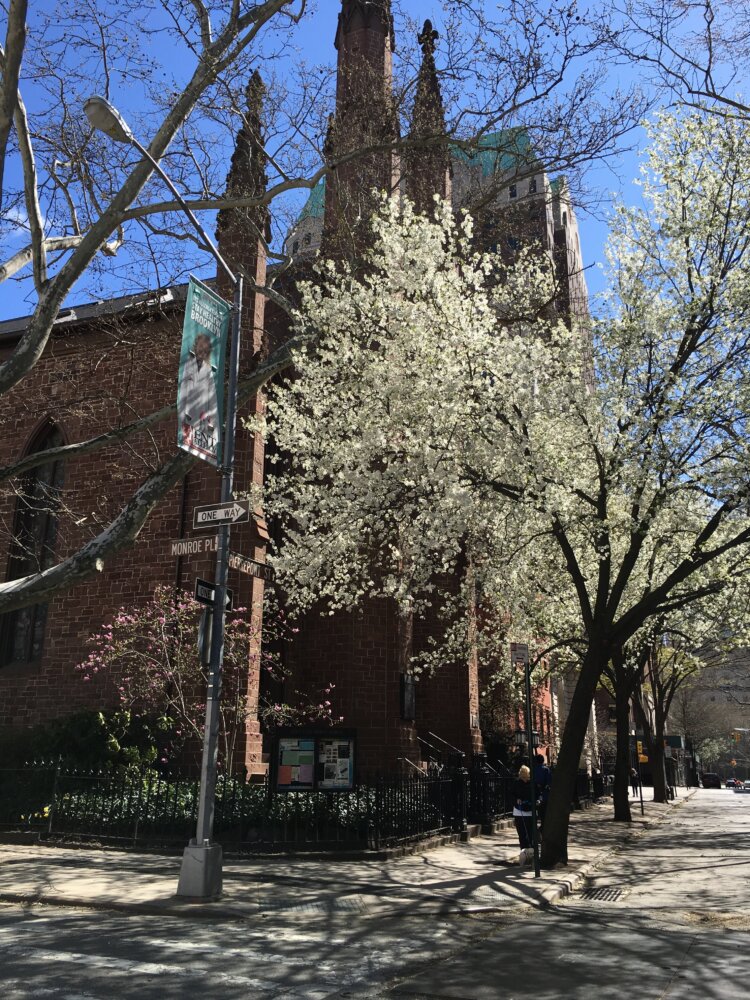
I stopped attending the Unitarian church of my youth nearly 40 years ago, when I started college. But it took two boys to bring me back: one entering my life, another leaving it.
My husband and I adopted our son, Altaseb, when he was 5 in the fall of 2012. Within the year, he began to ask the big questions: Do you believe in God? Where did the earth come from? Where did I come from? If God made the earth, as some people say, who made God? My husband and I, both on the border between agnostics and atheists, explained what we think, but I wanted him to have a place to ask such questions. A place like I had when I was young, the Main Line Unitarian Church, in Devon, Pennsylvania.
At the time that our son joined our family, my nephew Leon was diagnosed with osteosarcoma, a rare type of bone cancer. We were all optimistic that his first surgery—to replace his knee—would work, but a year after he had that operation, the cancer returned. We continued to keep our faith in science that the treatments would work.
In 2014, when I was discussing spirituality for kids with my friend Catalina, whose son played soccer with mine, she suggested I visit the First Congregational Unitarian Society in downtown Brooklyn, not far from our own Park Slope neighborhood. I started to go there, but regular attendance was a challenge—mostly due to Altaseb’s morning soccer matches. When he didn’t have a game, it was a struggle to get him out the door to “school” on a Sunday.
It didn’t help that my husband is against the concept of any church—religion has caused strife throughout the world for centuries, etc. He’s right, but, I counter, a church has also been the basis of community. Specifically the Unitarian Universalist Church is a place to explore human spirituality, faith, and our place in the universe, as keepers of the planet.
So I continued to attend solo. I found myself looking forward to hearing Rev. Ana Levy-Lyons’ lively sermons, the choir, the grand organ and the music on jazz Sundays. I found myself smiling a lot.
As Leon got sicker and the outcome looked like the worst possible, I lit candles at the church and wept in the pews during meditation. I found myself attending more, knowing I wouldn’t find answers, but might find peace. When he died in March 2016, I spent a lot of time grieving. I grieved everywhere, but at the Unitarian church I had a space to reflect. Be soothed by music. Be distracted by words. And be devastated.
I have visited other Unitarian churches, but didn’t have the urge to join. For the past few decades, I’ve been lucky to have a tight community of friends and wasn’t really looking for a place to reflect. Plus, we were heavy into NYC nightlife—rock ‘n’ roll forever! And we slept in on Sundays.
But when we were kids, in the ‘60s and ‘70s, my mother, an active Unitarian, would take me and my three brothers to Sunday school every week. I recall many lessons about ethical/moral behavior—such as, if you see a friend stealing, what do you do?
Even dad, who wasn’t a regular churchgoer (he preferred to worship Sunday football) went with us to the Christmas Eve candlelight services. Because some members of the congregation didn’t want any mention of Jesus, on one Christmas Eve, Jesus wasn’t mentioned at all. The Christmas story involved a regular old baby born in a manger, and modern dancers in black leotards performed. My dad and I got a good chuckle over that. The following year, the celebration was more traditional, the birth of a baby named Jesus—yet not necessarily the son of God.
On one Christmas Eve, Jesus wasn’t mentioned at all. The Christmas story involved a regular old baby born in a manger, and modern dancers in black leotards performed.
Mom, who was raised Protestant, but became disillusioned with the notion of God early on, was really involved in the church—particularly the activism part. She took busses to Washington for anti-Vietnam protests and the no-nukes rally (I attended the latter with her as a high schooler). She was an integral part of whatever groups sought human rights or an environmentally sound planet.
In reality, the MLUC saved my mom’s life, helping her escape from an oft-lonely marriage and the chaos of raising four children, while guiding her in her lifelong mission to make the world a better place. She, now 97, traveled by bus with her fellow members of the church to her final Washington march at age 89.
I only dabble in activism. Yes, I went to the million-women march and belong to the Sierra Club, but I knew this place had plenty of opportunities to participate more. However, joining didn’t come easily to me.
I loved seeing Catalina there, but the post-service coffee hour was awkward for me. I am not a wallflower, but I felt like one.
When my friend Rev. Dr. Kelly Murphy Mason, who officiated our wedding, became community minister, that changed everything. I chatted with her and her husband at coffee hours. I attended her post-service seminar to discuss Christianity and Unitarianism in this old Brooklyn church, which has gorgeous stained-glass windows, gothic arches, a historic organ and a major pulpit.
In March, when a longtime member approached me during the annual fund drive, she let me off the hook by saying, “You’re not ready yet. You’re too new.” I realized then that I have been attending this church for nearly three years! But unlike other members who felt an instant connection and joined within months of their first Sunday, I wasn’t ready.
Around the same time, as the tragic anniversary of Leon’s death neared, I recalled how meaningful it has been for me attend services. And I love Rev. Ana Levy-Lyons’ sermons, which are inspiring, modern and clever. I don’t know many people there, but Rev. Ana manages to connect us to each other—and to people far and near. When I mentioned to a friend I might be joining the church (a phrase that often raises eyebrows), she assumed I am looking for community. She is only half-right. As a stay-at-home, writer mom, I don’t get to have many serendipitous adult conversations, but there I’m looking for meaning—to reflect and raise my awareness.
So I decided to stop being an outsider and to commit. Without my family, it feels like my mom all over again, but it’s not. For me, it’s more of an enhancement, not salvation. During coffee hour, my friend David convinced me to sign the paperwork to become a member right then and there. Rev. Ana happened to be nearby. She congratulated me and we hugged. It was super sweet.
I got an email from the community director, who was thrilled to learn I am a lifelong Unitarian. The following Sunday, I stopped in to sign the well-worn membership book, which dates back to 1833, and a formal ceremony was held on Earth Day. I pinned on a white carnation, stood on a chorus riser and pledged. Looking out over the congregation. It felt like a big deal. My husband attended, but my son had a Little League game (I missed his broken-bat single!). To keep my family involved to some degree, I plan to share what I learn at home. Our own personal TED talks. Whether it’s to discuss the real miracle behind turning water into wine or the Ten Commandments.
I didn’t know I was looking for a spiritual home, but I found one.


Grok Nation Comment Policy
We welcome thoughtful, grokky comments—keep your negativity and spam to yourself. Please read our Comment Policy before commenting.